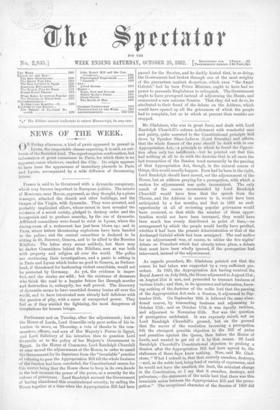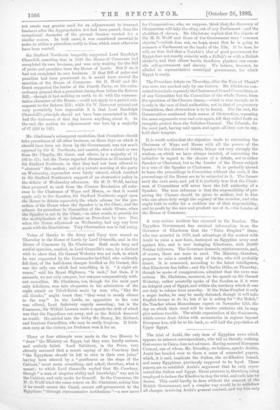As regards precedent, Mr. Gladstone pointed out that the course
he had taken was supported by a very sufficient pre- cedent. In 1820, the Appropriation Act having received the Royal Assent on July 20th, the House adjourned to August 21st; on August 21st it met, and proceeded to transact business of various kinds ; and then, in its ignorance and infatuation, know- ing nothing of the doctrine of the noble lord that the passing of the Appropriation Act ends a Session, it adjourned to Sep- tember 18th. On September 18th it followed the same aban- doned course, by transacting business and adjourning to October 17th; and on October 17th it was equally reckless, and adjourned to November 2tith. Nor was the question of prorogation undebated. It was expressly raised, not on Lord Randolph Churchill's ground, but on the ground that the mover of the resolution favouring a prorogation felt the strongest possible objection to the Bill of pains and penalties against the Queen, then before the House of Lords, and wanted to get rid of it by that means. Of Lord Randolph Churchill's Constitutional objection to prolong a
to, the Session after the Appropriation Bill had been agreed
statesmen of these days knew nothing. Now, said Mr. Glad- stone, "What I submit is, that that entirely smashes, destroys, —and, as the noble lord, being fond of variety of expression, said he would not have the smallest, the least, the minuteet change in the Constitution, so I say that it smashes, destroys, and pulverises,—the statement of the noble lord that there was this invariable union between the Appropriation Bill and the proro- gation." The exceptional character of the Session of 1820 did
not create any greater need for an adjournment to transact, business after the Appropriation Act had been passed, than the exceptional character of the present Session created for a similar course. In both 'eases, it was considered essential in order to utilise a procedure costly in time, which must otherwise have been wasted.



































